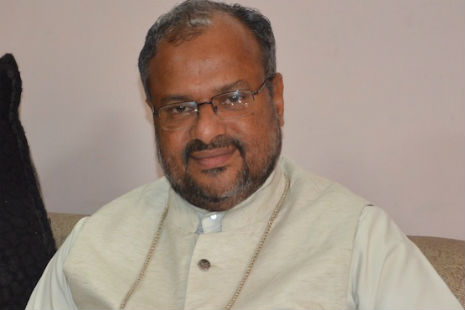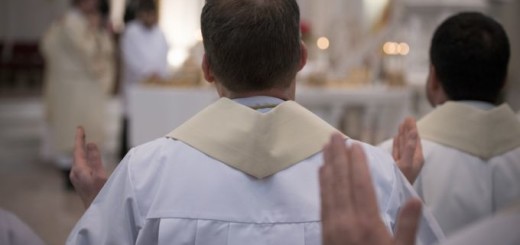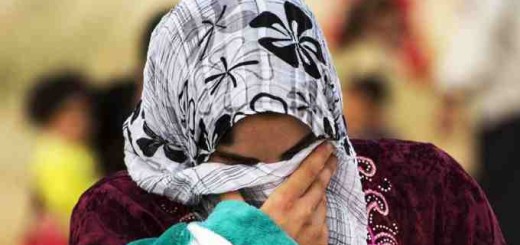Modern slavery challenges Catholic bishop Franco Mulakkal of Jalandhar Punjab

Cover photo: Bishop Franco Mulakkal of Jalandhar (ucanews.com photo).
LA CROIX INTERNATIONAL.
Ritu Sharma, New Delhi, India.
October 24, 2017
 Many Christians still work as bonded labourers, with whole families being "pledged" to landlords of Punjab as security for loans. The 52-year-old bishop Franco Mulakkal of Jalandhar says the local church works to better integrate the minuscule Christian community with the majority Sikhs in the state. As the report in La Croix International reveals, Bishop Franco Mulakkal is working like a true Pastor trying to ensure his lost sheep are found and brought back to safety. Isaac Gomes, Asso. Editor, Church Citizens' Voice.
Many Christians still work as bonded labourers, with whole families being "pledged" to landlords of Punjab as security for loans. The 52-year-old bishop Franco Mulakkal of Jalandhar says the local church works to better integrate the minuscule Christian community with the majority Sikhs in the state. As the report in La Croix International reveals, Bishop Franco Mulakkal is working like a true Pastor trying to ensure his lost sheep are found and brought back to safety. Isaac Gomes, Asso. Editor, Church Citizens' Voice.
When Bishop Franco Mulakkal took charge of Jalandhar Diocese in the Indian state of Punjab four years ago, he was confronted with remaining pockets of modern-day slavery.
There were also rifts between Christian denominations – including over alleged "flock poaching" – as well as a crying need for improved integration with the Sikh majority.
"We try to reach out to Christians and poor people of every religion living without human dignity and without equal opportunity as they also have the right to a good life," Bishop Mulakkal said.
Many non-Christian and Christian Dalits still work as bonded labourers. Whole families are "pledged" to landlords as security for loans.
Studies indicate that Punjabi Christians – compared to Christians in the rest of India – are more generally urbanized, literate and progressive.
Sikhs, of whom many are landlords and rich farmers, form 58 per cent of the state's 28 million people followed by Hindus with 38 percent. The rest of the population is Buddhist, Christian and Muslim.
Christians, 1.1 percent of the population, are mostly poor Dalits – members of the former "untouchable" castes. Catholics number around 100,000.
Bishop Mulakkal said some priests tried to liberate bonded families from the clutches of landlords. However, those involved needed to be "psychologically prepared" to not go back to their old ways and that required the instilling of greater social awareness through education.
Progress had been made in training unemployed young men to work as security guards, mostly in the diocese's schools and other institutions.
Bishop Mulakkal, 52, who is also chairman of the youth commission of the Conference of Catholic Bishops of India, said Christians were slowly coming to understand their rights and duties as citizens.
Church vocations in the diocese are on the rise. Last year, 107 girls elected to become nuns and 55 boys volunteered for the priesthood.
"They see us working and living for others and that encourages them," Bishop Mulakkal said.
Lack of Cemeteries
The bishop has also been working to overcome the "very big problem" of a shortage of Christian burial grounds in Punjab. The government has total control over cemeteries, including the allotting of land.
There are currently only two cemeteries for Christians in the three big cities of Amritsar, Gurdaspur, and Jalandhar. However, Bishop Mulakkal said solutions should be found through constructive discussions with government officials rather than disruptive protests.
Bishop Mulakkal is also the consulter of the Pontifical Council for Inter-religious Dialogue in Rome.
Growing Mission
Until partition of British India in 1947, the diocesan area was part of the then Lahore Diocese where Christianity arrived in the 16th century with Jesuit missioners. It was only in the 19th century that a Catholic mission was established under the Belgian Capuchins.
British Protestant missioners came to Punjab some 180 years ago and have been successful in converting hundreds of local people, mostly Dalits. Methodists also developed missions in the area.
But the past decades have witnessed rivalry between these denominations and complaints of "sheep stealing", a term used to denote allegations of one denomination taking away Christians from another.
Bishop Mulakkal said three years ago he "personally contacted" Methodist Bishop Yunus Masih of Chandigarh and the Protestant Church of North India Bishop P.K. Samantaroy of Amritsar. "I invited them over for a cup of tea," he said.
The result was the formation of a collaborative Masih Mahasabha (Jesus Assembly) consisting of Catholic, Protestant, Salvation Army, Methodist, and other mainline churches.
For example, a state-level ecumenical Christmas program was organized for the first time last year.
















